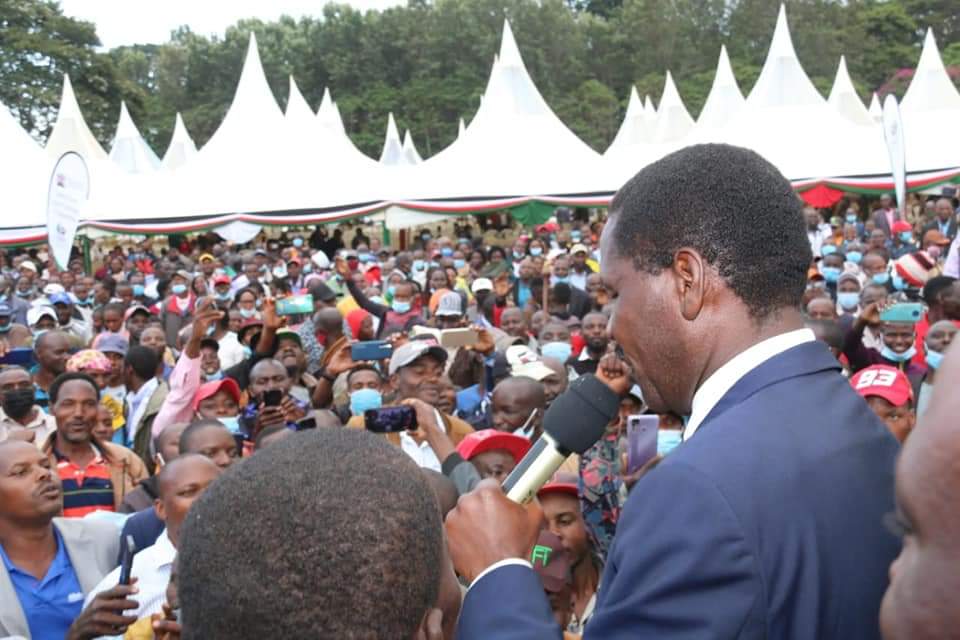Reports that Agriculture Cabinet Secretary Peter Munya was set to resign to join active politics has jolted farmers who are now publicly pleading with him not to abandon them after turning around their fortunes for the better.
Farmers are afraid that should Munya leave the agricultural docket all the gains they have made under his leadership will be lost and vicious cartels that he destroyed will regroup and suffocate the sector.
At a meeting in Murang’a, coffee farmers pleaded with Munya not to resign saying they were already enjoying the benefits of his sweeping reforms and want him to continue serving them at the ministry.
“We have heard that you want to resign. Please do not resign. We want you to continue at the Ministry. We are worried that all the benefits will be lost should you resign now,’’ said the farmer.
The CS who was speaking during a sensitization meeting at Murang’a’s Ihura stadium where he said the government has mapped out all the coffee societies in the country affiliated to the new Kenya Coffee Planters Cooperative Union which will be charge of the subsidy programme.
The subsidy programme is aimed at providing affordable and accessible inputs to smallholder coffee farmers all over the country thus promoting sustainable increase in income among the Coffee growers through improved productivity.
“The main aim of this subsidy programme is to lower the costs of coffee production in the country which will see improved livelihoods among our farmers,” Munya told the farmers.
This stimulus programme , the CS noted targets 82,650 farmers in the 32 coffee growing counties both smallholder coffee farmers belonging to a cooperative society and small estate coffee farmers or any other farmer belonging to an association holding less than 20 acres of land under coffee.
The New KPCU has been given the mandate to manage and administer the Coffee Farm Inputs Subsidy programmme alongside that of Coffee Cherry Advance Revolving Fund.
According to CS Munya the targeted beneficiaries will consist of both smallholder coffee farmers belonging to a cooperative society and small estate coffee farmers or any other farmer belonging to an association holding less than 20 acres of land under coffee.
However, the CS said for the pilot phase, farmers with 10 acres of coffee or an equivalent number of coffee trees will be eligible for the subsidy.
He said the subsidy will only be available for farmers milling or marketing their produce with New KPCU) and any farmer who is in need of the subsidy will be required to give an undertaking that they will repay the advance.
This will be done through their choice millers or marketing agent if they are not milling or marketing their produce through New KPCU.
“The beneficiaries must be willing to provide all necessary bio-data and the subsequent surveys through the society. Beneficiaries must be able and willing to provide beneficiary contributions which stand at 60 percent of the e-voucher value,” the CS announced.
However the CS noted that coffee farmers who are already receiving similar subsidy programs for coffee are not eligible. He explained that through the programme farmers will be required first to open a bank account with the partner financial institutions.
“Farmers seeking to access the subsidy are required to follow the guidelines whereby they will have to commit themselves that the inputs received will be used as recommended and for the intended purpose,” he said.
They are also required to participate in all the training and adhere to the developed coffee input application schedule. The new guidelines further require the farmers to provide land and labour for timely activities while at the same time observing cooperative by-laws so as to counter cases of defaulters.
On implementation of the program it will boost national average coffee production from 2kgs per tree to 5kgs, increase coffee growers gross earning per year by 50% and improve quality of coffee premium grades produced from current 70% to 90% by 2024.
Kenya aims to boost coffee output from the current 40,000 metric tons to 100,000 metric tons.
President Uhuru Kenyatta in 2019 announced the establishment of a 30 million dollar revolving fund to cushion more than 700,000 small-holder coffee farmers from bottlenecks like delayed payments and high cost of production.

